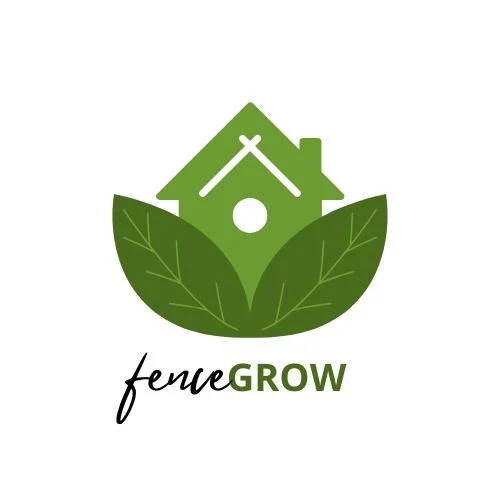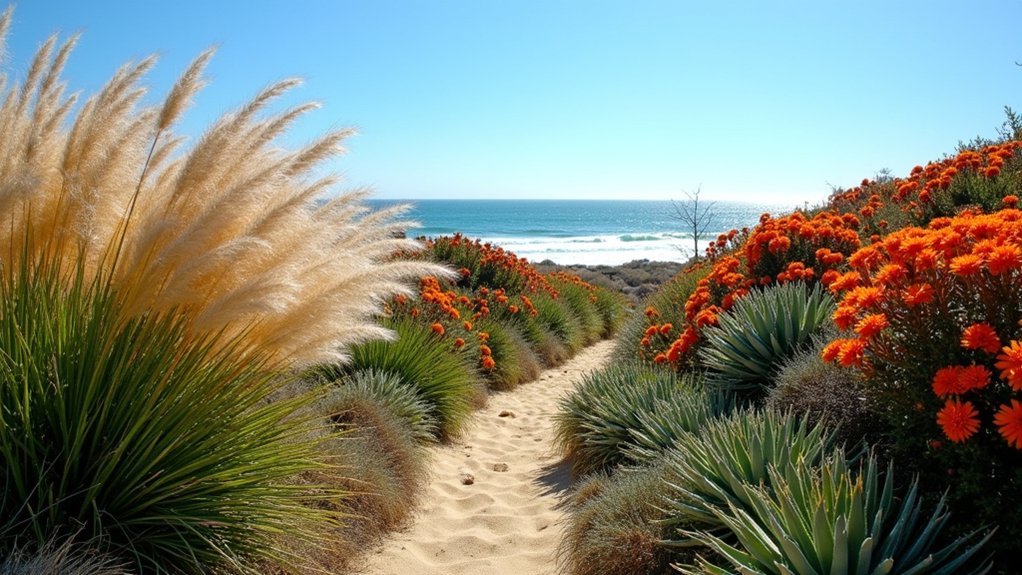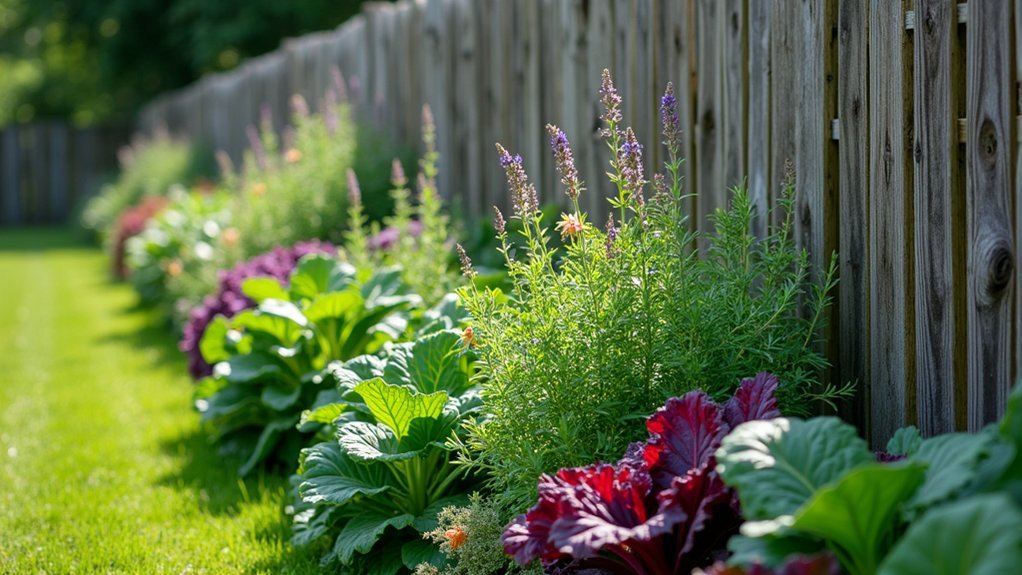When you're building a secure fence, choosing the right jute twine makes all the difference between a structure that withstands the elements and one that fails when you need it most. Natural jute offers eco-friendly durability without the environmental downsides of synthetic materials. You'll find varying thicknesses and lengths on the market, each suited for different fence construction needs. Let's examine the top three options that professionals trust for projects that must stand the test of time.
100 Feet 5mm Jute Twine, Heavy Duty Natural Hemp Rope for Crafts
Homesteaders and DIY enthusiasts will find the Zakous 100 Feet 5mm Jute Twine ideal for fence construction projects that require both strength and environmental consciousness. At 5mm thickness, this heavy-duty twine provides reliable support while remaining biodegradable.
You'll appreciate its versatility beyond fencing—use it for garden supports, bundling materials, or reinforcing fence sections. The 100-foot length gives you plenty to work with, and you can easily cut it to your specific needs. With a 4.7-star rating from over 1,200 customers, this eco-friendly rope delivers performance without compromising your environmental values.
Best For: Homesteaders, gardeners, and DIY enthusiasts seeking an eco-friendly, versatile natural twine for projects ranging from garden supports to crafts and home decoration.
Pros:
- Made from 100% natural jute fiber that is biodegradable and environmentally friendly while maintaining impressive strength
- Versatile 5mm thickness provides the perfect balance of strength and flexibility for various applications from gardening to crafts
- Generous 100-foot length allows for multiple projects and comes well-packaged to prevent tangling
Cons:
- At 10.8 ounces, it may be heavier than synthetic alternatives for projects where weight is a concern
- Natural jute fiber may degrade more quickly than synthetic options when exposed to constant moisture or outdoor elements
- Limited to a single thickness option (5mm), which may be too thick for more delicate craft projects
Jute Rope for Gardening and DIY Crafts (6mm)
Eco-conscious DIY enthusiasts will find the 6mm jute rope an essential addition to their toolkit. This 50-foot, 1/4-inch natural twine offers impressive durability while remaining environmentally friendly and biodegradable.
You'll appreciate its versatility for both indoor projects like crafts and home decor, and outdoor applications including fence construction and garden organization. The rope's UV and heat resistance guarantees longevity in all weather conditions.
For gardening, the soft fibers won't damage delicate plants like harsher metal or plastic alternatives might. While some customers noted a chemical smell upon unpacking, most praised its strength and performance across various applications.
Best For: Environmentally-conscious gardeners and craft enthusiasts seeking a strong, versatile natural rope for both indoor and outdoor projects.
Pros:
- Eco-friendly and biodegradable, making it a sustainable alternative to synthetic ropes
- Versatile for multiple applications from garden use to home decor and DIY crafts
- Durable with UV and heat resistance for extended outdoor use
Cons:
- Some customers reported a strong chemical smell upon initial unpacking
- Limited length (50 feet) may require purchasing multiple units for larger projects
- Natural jute material may deteriorate faster than synthetic alternatives when exposed to constant moisture
PerkHomy Natural Jute Twine 600 Feet for Crafts and Gardening
Fence builders seeking both durability and eco-friendliness will find PerkHomy's Natural Jute Twine an excellent choice for their projects. At 600 feet long and 2mm thick, this 100% natural jute fiber rope offers impressive versatility for securing fence components.
You'll appreciate its resistance to abrasion, corrosion, and rain—crucial qualities for outdoor fence construction. The twine's soft yet strong texture prevents damage to wooden posts and rails while maintaining secure bindings.
With an impressive 4.7-star rating from over 7,000 reviews, this Chinese-manufactured twine delivers reliability that serious DIYers demand. Its biodegradable nature guarantees your fence construction leaves minimal environmental impact when it's eventually replaced.
Best For: Gardeners, crafters, and DIY enthusiasts looking for an eco-friendly, versatile twine for light-duty projects like plant support, gift wrapping, and decorative applications.
Pros:
- 100% natural jute fiber that's biodegradable and environmentally friendly
- Impressive 600-foot length provides excellent value for multiple projects
- Versatile 2mm thickness offers good balance of strength and flexibility for crafts and gardening
Cons:
- Not specifically designed or marketed for heavy-duty fence construction
- May deteriorate over time when exposed to prolonged outdoor elements despite claims of weather resistance
- Made in China, which may concern those preferring locally manufactured products
Factors to Consider When Choosing Natural Jute Twine for Secure Fence Construction
When selecting jute twine for fence construction, you'll need to evaluate essential factors like diameter and load capacity to guarantee your structure remains secure. You should also consider the twine's weather resistance properties and material quality, as these directly impact longevity in outdoor conditions. Properly evaluating length requirements and eco-friendly composition will help you choose twine that's both practical for your specific fencing project and environmentally responsible.
Diameter and Load Capacity
Strength and stability in fence construction largely depend on selecting the right jute twine diameter. When choosing twine for your project, remember that thicker diameters generally support heavier loads and withstand greater tension.
A 5mm diameter jute twine offers an excellent balance between strength and flexibility, making it perfect for securing lightweight fencing materials. If you're planning for long-term outdoor applications, consider upgrading to 6mm twine, which provides enhanced durability and resistance to environmental wear.
Don't overlook the fiber quality when selecting your twine. Softer fibers can minimize damage to plants and structures while still delivering sufficient binding strength. Despite similar diameters, different manufacturers' twines may have varying load capacities, so always check the specifications before making your final decision.
Weather Resistance Properties
Despite its natural origins, jute twine offers surprising weather resistance that makes it suitable for outdoor fence construction. Its inherent UV resistance prevents sun damage, extending its usable life in exposed locations.
You'll appreciate jute's balanced performance in various weather conditions. While not completely waterproof, it can withstand light rain and moisture without immediate deterioration. However, for fence projects in consistently wet climates, you should consider thicker jute varieties for added durability.
The natural abrasion resistance of jute helps it maintain structural integrity when rubbing against fence posts or when exposed to wind movement. When selecting twine for your fence project, prioritize thickness—thicker jute provides superior weather resistance and strength. This natural resilience makes jute an environmentally responsible choice that doesn't sacrifice functional performance.
Material Quality Assessment
Quality assessment stands at the core of selecting the right jute twine for fence construction. You'll want to verify that your twine is made from 100% natural jute fiber, ensuring maximum strength and longevity for your fencing project.
Pay close attention to diameter specifications—opt for thicker varieties (5-6mm) that provide superior tensile strength for outdoor applications. The best twine balances durability with eco-friendliness, being fully biodegradable and sustainably sourced.
Don't overlook resistance properties when evaluating material quality. High-grade jute twine offers enhanced resistance to UV light and moisture, critical factors for maintaining structural integrity in outdoor settings. Additionally, superior twine demonstrates excellent abrasion and corrosion resistance, allowing it to withstand harsh weather conditions and regular handling without compromising your fence's security.
Length Requirements Analysis
When planning your fence construction project, accurately determining twine length requirements will save you time, money, and frustration. You'll need to carefully assess the perimeter of your enclosure first—small sections typically require at least 50 feet of twine, while larger areas may demand 100+ feet.
Consider the twine's diameter as well. Thicker jute offers greater strength and might reduce the overall length needed for your project. The weight and tension of your fencing materials will also impact your calculations, as heavier elements demand additional twine support.
Don't forget to account for extra length needed for knots, overlaps, and adjustments during installation. Adding 10-15% to your estimated measurement provides a safety buffer that guarantees you won't run short midway through your fence construction.
Eco-Friendly Composition Factors
Choosing natural jute twine for your fence construction isn't just a practical decision—it's an environmental commitment. When selecting the right jute twine, pay attention to its biodegradable properties that guarantee it breaks down naturally over time without releasing harmful substances into your soil.
Look for twine made from 100% renewable jute fibers, which considerably reduces the carbon footprint compared to synthetic alternatives. Quality jute products contain no chemical additives or treatments that could lead to toxic runoff around your property.
Despite its eco-friendly nature, don't compromise on durability. The best natural jute twines maintain structural integrity in outdoor conditions while still adhering to sustainable principles. By prioritizing these composition factors, you'll create a fence that's not only secure but also aligned with environmentally conscious building practices.
Application-Specific Strength Needs
The strength requirements for your fence project considerably impact which jute twine will deliver lasting results. For structural fencing that needs to withstand significant strain from animals or harsh weather conditions, opt for thicker diameters of 5-6mm, which provide superior tensile strength and breaking resistance.
You'll need to match the twine's capabilities to your specific application. Livestock containment demands stronger twine than garden fencing. Consider both the weight the twine must support and environmental factors it will face. UV-resistant varieties are crucial for sunny locations, while moisture-resistant options perform better in humid or rainy climates.
Don't overlook length considerations—larger projects benefit from longer rolls, reducing the number of tie-offs required and streamlining installation. The right strength profile guarantees your natural fencing solution remains secure while maintaining its eco-friendly benefits.
Frequently Asked Questions
Does Jute Twine Weather Well in Extreme Climates?
Jute twine doesn't weather well in extreme climates. You'll find it deteriorates quickly when exposed to moisture, UV rays, and temperature fluctuations. For outdoor projects, you're better off choosing synthetic twines for longevity.
How Long Does Jute Twine Last Before Needing Replacement?
You'll need to replace outdoor jute twine every 1-2 years, as it degrades with moisture and sunlight. For indoor uses, it can last 3-5 years. Your climate conditions will affect its longevity considerably.
Can Jute Twine Support Heavy Wire Fencing?
Jute twine isn't ideal for supporting heavy wire fencing. It's better to use galvanized wire or metal ties instead. You'll find jute degrades too quickly outdoors and lacks the tensile strength needed for substantial weight.
Is Jute Twine Resistant to Animal Chewing or Damage?
Jute twine isn't highly resistant to animal chewing. Rodents, deer, and other wildlife can easily damage it. If you're concerned about animal interference, you'll want to choose synthetic options like polypropylene or metal wire instead.
Can Jute Twine Be Safely Used Around Vegetable Gardens?
Yes, you can safely use jute twine in vegetable gardens. It's biodegradable, non-toxic to plants, and won't contaminate soil. When it eventually breaks down, it'll actually add organic matter to your garden.





Leave a Reply